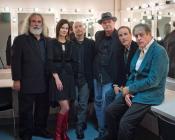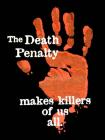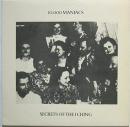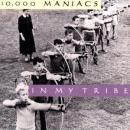"Mercy, mercy," why didn't we hear it?
"mercy, mercy," why did we read it
buried on the last page of our morning papers?
The plan was drafted, drafted in secret
gunboats met the red tide
driven to the rum trade
for the army that they created
but the bullets were bought by us
it was dollars that paid them
Please forgive us
we don't know what was done
in our name
There'll be more trials like this in mercenary heydays
when they're so apt to wrap themselves up
in the stripes and stars and find that they are able
to call themselves heroes
to justify murder
by their fighters for freedom
Please forgive us
we don't know what was done
please forgive us, we didn't know
Could you ever forgive us?
I don't know how you could
I know this is no consolation...
Please forgive us
we didn't know
Could you ever believe that
we didn't know?
Please forgive us
we didn't know
I wouldn't blame you
if you never could
"mercy, mercy," why did we read it
buried on the last page of our morning papers?
The plan was drafted, drafted in secret
gunboats met the red tide
driven to the rum trade
for the army that they created
but the bullets were bought by us
it was dollars that paid them
Please forgive us
we don't know what was done
in our name
There'll be more trials like this in mercenary heydays
when they're so apt to wrap themselves up
in the stripes and stars and find that they are able
to call themselves heroes
to justify murder
by their fighters for freedom
Please forgive us
we don't know what was done
please forgive us, we didn't know
Could you ever forgive us?
I don't know how you could
I know this is no consolation...
Please forgive us
we didn't know
Could you ever believe that
we didn't know?
Please forgive us
we didn't know
I wouldn't blame you
if you never could
Contributed by Bartleby - 2012/3/7 - 09:12
×
![]()
Note for non-Italian users: Sorry, though the interface of this website is translated into English, most commentaries and biographies are in Italian and/or in other languages like French, German, Spanish, Russian etc.







Album “Blind Man's Zoo”
L'Iran-Contras affair (noto anche col nome di Irangate) è lo scandalo politico che nel 1985-1986 coinvolse vari alti funzionari dell'amministrazione del presidente degli Stati Uniti Ronald Reagan accusati dell'organizzazione di un traffico illegale di armi con l'Iran. I proventi di questa operazione erano serviti a finanziare l'opposizione violenta dei Contras al governo sandinista del Nicaragua. La vendita di armi all'Iran era stata pianificata puntando al rilascio di alcuni ostaggi statunitensi in quel momento nelle mani di Hezbollah in Libano, organizzazione legata all'Iran.
L'Iran, all'epoca impegnato nella guerra contro l'Iraq di Saddam Hussein, pur violentemente antiamericano era molto sensibile alle offerte di materiale USA, visto che la maggior parte delle sue forze armate erano equipaggiate proprio con veicoli e armi fabbricate negli Stati Uniti, acquistate dallo shah Mohammed Reza Pahlavi prima della sua cacciata.
L'Iran aveva cercato di diversificare le proprie fonti di approvvigionamento, rivolgendosi alla Siria (nemica dell'Iraq per la forte rivalità fra Assad e Hussein), la Libia di Gheddafi e la Cina ma ciononostante i missili anticarro TOW ed i pezzi di ricambio per le batterie antiaeree HAWK erano assolutamente necessari allo sforzo bellico.
In un primo momento gli USA non trasferirono direttamente materiale, ma si limitarono a rivelare al governo di Teheran la localizzazione di magazzini segreti di pezzi di ricambio e munizioni che la paranoia dello Shah aveva fatto installare in sperdute località iraniane, curando che solo alcuni fedelissimi ufficiali (tutti fuggiti durante la rivoluzione) ne conoscessero l'ubicazione.
In seguito, esauriti i 'depositi segreti', gli USA si dimostrarono disposti a fornire armi e munizioni "ex novo", ma decisero di farlo in maniera segreta e al di fuori del controllo del Congresso (che secondo le leggi deve approvare ogni aiuto militare a potenze estere) in modo da destinare i proventi di tale traffico al sostegno delle operazioni di guerriglia e terrorismo in America Centrale.
Nel novembre del 1986 un giornale libanese rivelò l'esistenza del traffico clandestino. Le indagini effettuate fecero collegare la situazione con la parallela operazione segreta in Nicaragua. Nel novembre del 1987 una commissione d'inchiesta con a capo l'ex senatore John Tower emise una dura condanna all'operato del Presidente, non provando con certezza la conoscenza da parte sua dei finanziamenti illegali ai Contras.
Nel 1992 il Presidente George Bush sr., vicepresidente nel momento dello scandalo e sospettato di essere coinvolto nello stesso, concesse un'amnistia a tutti gli alti ufficiali indiziati o condannati per la questione Iran-Contras.
(fonte: it.wikipedia)
"I don't want people to put too much weight on the political side of that song. Mostly it's just a way to communicate to people down there (Central America) that there are people here who don't agree with what our government does. I wanted them to know that there are people here who are not responsible for it. I know that no matter how much money I give to send medical aid, I can't bring back people who have died or been hurt by these actions."
(da un’intervista a Natalie Merchant pubblicata sul St. Louis Post-Dispatch nel 1989)
Bisogna poi aggiungere che un altro canale di finanziamento della controguerriglia in Centro America fu il massiccio traffico di droga. I ghetti statunitensi furono inondati di droga purissima a prezzi stracciati. Il governo USA ottenne così un duplice risultato: finanziare occultamente la guerra sporca contro i sandinisti e sedare (meglio, narcotizzare) le turbolenze ed il malcontento interni fortemente accentuatisi fra gli strati più poveri della popolazione nell’era delle “Reaganomics”…(Bartleby)